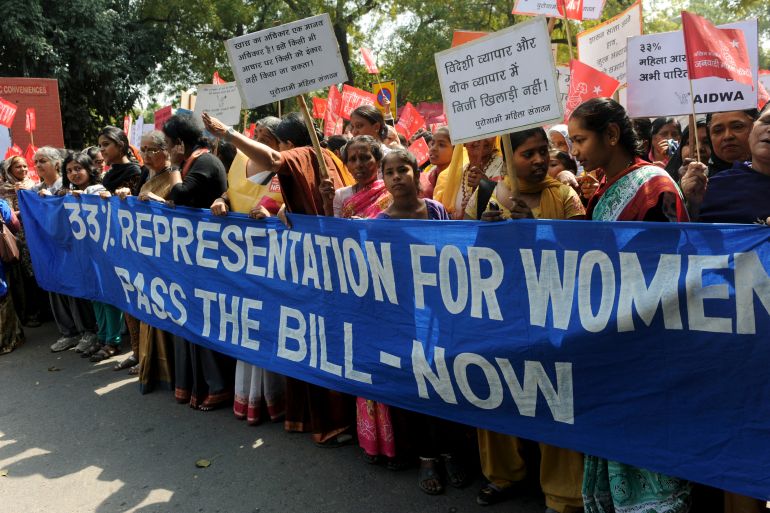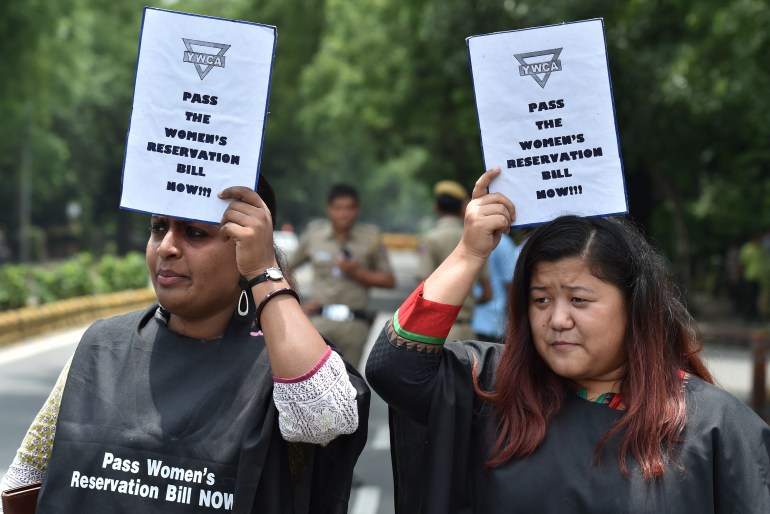India: 25 years on, Women’s Reservation Bill still not a reality
India ranks 148th in a list of 193 countries based on the percentage of elected women representatives in their national parliaments.

New Delhi, India – “This is a special day in the history of our country…”
These were the opening remarks of a debate that took place on September 12, 1996, in the Lok Sabha, the Indian parliament’s lower house.
Keep reading
list of 4 itemsIndian female politicians face online abuse: Study
Women’s suffrage fight not ‘purely Western phenomenon’
The solitude of female politicians in South Asia
On the agenda was the introduction of a constitutional amendment bill that sought to reserve one-third of seats for women in the Lok Sabha and state legislative assemblies.
Similar versions of the bill were introduced later in 1998, 1999, and 2008, but all four lapsed with the dissolution of those governments.
Twenty-five years after it was first introduced in parliament, the Women’s Reservation Bill continues to languish and is yet to become a reality.
Political leaders and experts say that while the initial delay was due to concerns over the issue of intersectionality, at the heart of the delays is the unwillingness to share power and fear of losing bastions of electoral support.
An analysis by the PRS Legislative Research shows that female representatives make up less than 15 percent in Lok Sabha and the legislative assemblies, based on the results of the last state elections.
There are 78 women MPs in Lok Sabha today. This is the highest number in the history of Lok Sabha. The first LS only had 24 women members. Calls have been made for women’s reservation in legislatures to increase representation. #Thread:
1/
— PRS Legislative (@PRSLegislative) March 8, 2021
Studies and experts agree that a lack of political participation by women has an impact on policy framing and diversity in decision making.
Globally, India ranks 148th in a list of 193 countries based on the percentage of elected women representatives in their national parliaments, as of June this year.
The same data shows that while the global average for “lower chamber or unicameral” is 25.8 percent, India stands at 14.4 percent with 78 out of 543 Lok Sabha representatives elected in 2019 being women, the highest number to date.
India’s parliament is bicameral and female members make up 11.6 percent of the upper house or Rajya Sabha.

Long wait
In those 25 years, each time the bill came up for discussion or passage, the Indian parliament saw high drama and hostile resistance. From objectionable comments about women to physical scuffles and ill-tempered debates – the bill has seen it all.
During earlier discussions, a section of India’s regional parties opposed the bill over intersectionality, worrying that such a blanket reservation would mainly favour upper-caste candidates.
“The 1996 debate was not so much pro- or anti-women but revolved around the contention that such a blanket reservation for women would skew the caste combination of parliament in favour of upper castes. It threw up many more questions than what was anticipated in 1996,” said Mary E John, professor at New Delhi-based Centre for Women’s Development Studies.
A later version of the bill in 2008 proposed that one-third of the seats would be reserved for women from groups such as the Scheduled Castes and Scheduled Tribes.
Over the years, most of the key Indian political parties have, in principle, supported the bill but resistance from within continues.
In the past, attempts have been made to pass the bill by parties of different hues, including the right-wing Bharatiya Janata Party (BJP), Congress, and the United Front coalition government which brought the first legislation in 1996.
In 2010, the upper house of parliament passed a constitutional amendment bill saying that the reservation would cease to exist 15 years after it is implemented. The bill then needed to be passed by the Lok Sabha and ratified by half of India’s legislative assemblies.
However, it lapsed four years later due to a lack of political consensus.
“I believe that every political party should have a reservation within their organisation,” Sushmita Dev, leader of Trinamool Congress (TMC) and a former Lok Sabha member who headed the Congress party’s women wing till last month, told Al Jazeera.
With 48.5 percent of the population, Indian women deserved to be represented in elected bodies, she said. “I think it is a pure lack of conviction that women are not given reservation. Men do not want to give up their seats.”
The TMC governs the eastern state of West Bengal and is currently led by Mamata Banerjee, the only female chief minister in India.

In the past decade, the debate over the Women’s Reservation Bill did not feature prominently in the national political discourse, barring token discussions on occasions such as International Women’s Day and comments by some political leaders.
Experts fear its passage could still take a long time.
“Across the globe, willingness to give women power is absent and it will be a long journey. History is witness that wherever this hold (by men) gets weakened, we see spaces being made or women pushing to make these spaces for themselves,” Ranjana Kumari, director of New Delhi-based Centre for Social Research, told Al Jazeera.
Policy implications
Ahead of the 2014 national elections, activists and women rights organisations rallied over “womanifestoes”, which focused on socioeconomic empowerment for women and greater political representation.
Gauging the public mood, both the BJP and Congress, in their manifestoes for the 2014 and 2019 parliamentary elections, expressed their commitment to passing the bill.
At least 20 Indian states have given women 50-percent representation at the “panchayat” or village council level, a precedent that has been used by several academicians to assess its impact on policymaking.
A 2010 study showed that female representation on village councils increased female participation and responsiveness to concerns such as drinking water, infrastructure, sanitation and roads, without crowding out other disadvantaged groups.
“There is enough empirical evidence to suggest that feminisation of political governance leads to changes in public policy decisions and expenditure patterns. Studies have also found that such representation favours women’s preferences in fiscal policymaking,” Lekha Chakraborty, professor at New Delhi-based National Institute of Public Finance and Policy, told Al Jazeera.
Chakraborty added that more women representation brings more diversity to decision making.
“Thirty-three percent is crucial for protecting the diversity, talent and insight from a heterogenous perspective. Women’s reservation together with gender budgeting can be very crucial to India’s future progress towards gender equality,” she added.
Vandana Chavan, a Rajya Sabha member from the Nationalist Congress Party, said in her experience, almost all governance-related issues have a gendered perspective and more women representation is needed.
“There are so many women-related issues coming to the forefront like safety of women, nutrition among others. We believe that if society has to change, it has to change with women coming to the forefront who account for half of the country’s population,” said Chavan, who is based in Pune in the western state of Maharashtra.
She has been a representative at all three levels – local self-government, state and national.
Experts such as Kumari feel the “bottom line” is that women need to be more adequately represented because unless women become a “critical mass”, no real change will take place.
“This can be brought in any form, in a different kind of law if possible. But equality has to be ensured,” she told Al Jazeera.
All the experts and politicians Al Jazeera spoke to agreed that, given that issues related to women have taken centre stage and key political parties are in favour of the bill, the wait should end and the bill be brought to the parliament for passage.
Lok Sabha member Kanimozhi Karunanidhi of the Dravida Munnetra Kazhagam party asked during a session in July whether the government proposed to bring the Women’s Reservation Bill and if its details could be shared.
“Gender justice is an important commitment of the government. The issue involved needs careful consideration on the basis of the consensus among all political parties before a Bill for amendment in the Constitution is brought before Parliament,” the Ministry of Law and Justice said in a reply to her.